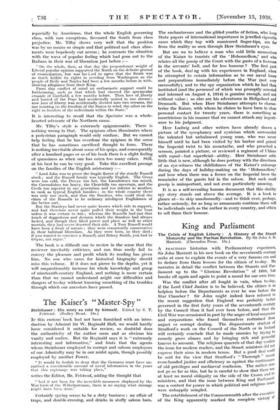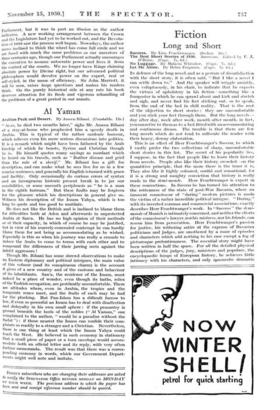King and Parliament
The Crisis of English Liberty : A History of the Stuart Monarchy and the Puritan Revolution. By Sir John A. R. Marriott. (Clarendon Press. 15s.) A PRACTISED historian with Parliamentary experience, Sir John Marriott in his new book on the seventeenth century seeks at once to explain the events of a very famous era and to deduce from them lessons for the citizen of to-day. He narrates in detail the conflict between the Stuarts and Par- liament up to the " Glorious Revolution " of 1688, but breaks off again and again to point a moral for our own time.
Was the conflict after all fought in vain, when to-day, if the Lord Chief Justice is to be believed, the citizen is as helpless before the Departments as ever he was before the Star Chamber ? Sir John might indeed have referred to the recent suggestion that England was probably better governed in the first forty years of the seventeenth century by the Council than it had ever been before, and that the Civil War was occasioned in part by the anger of local magnates and corporations who found themselves restrained from unjust or corrupt dealing. The dispassionate student of Strafford's work on the Council of the North or in Ireland will certainly conclude that he made encodes by trying to remedy gross abuses and by bringing rich and powerful knaves to account. The religious quarrels of that day confuse the issue for modern readers, and the Stuart ministers did not express their aims in modern terms. But a good deal could be said for the view that Strafford's " Thorough " meant even-handed justice and efficiency as against the continuance of old privileges and mediaeval confusion. The author does not go so far as this, but he is careful to show that there was at least no moral obliquity on the side of the Crown and its ministers, and that the issue between King and Parliament was a contest for power in which political and religious issues were unhappily mingled.
The establishment of the Commonwealth after the execution of the King apparently marked the complete victorY at
Parliament, but it was in part an illusion as the author indicates. A new working arrangement between the Crown and the Legislature had yet to be worked out, and the Revolu- tion of 1688 saw the process well begun. Nowadays, the author seems inclined to think the wheel has come full circle and we are faced with much the same problems as our ancestors of three centuries ago, though our Parliament actually encourages the executive to assume autocratic power and frees it from the control of the courts. We no longer have Kings claiming absolute power by Divine right, but our advanced political philosophers would devolve power on the expert, real or self-styled, in the name of efficiency. Sir John Marriott, it will be seen, raises large questions and makes his readers think. On the purely historical side at any rate his book deserves attention for its fresh and vigorous rehandling of the problems of a great period in our annals.









































 Previous page
Previous page